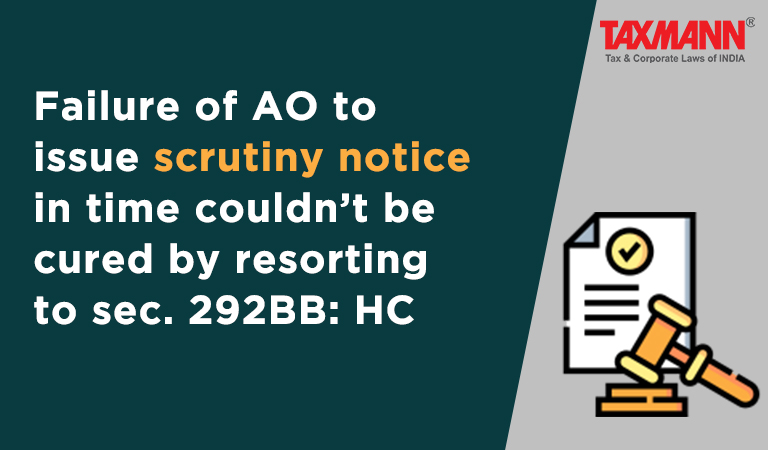Failure of AO to issue scrutiny notice in time couldn’t be cured by resorting to sec. 292BB: HC
- Blog|News|Income Tax|
- 3 Min Read
- By Taxmann
- |
- Last Updated on 18 April, 2022

Case Details: PCIT v. Cherian Abraham - [2022] 137 taxmann.com 73 (Karnataka)
Judiciary and Counsel Details
-
- Mrs. S. Sujatha and Ravi V. Hosmani, JJ.
- Jeevan J. Neeralgi, Adv. for the Appellant.
- Chythanya K.K., Adv. for the Respondent.
Facts of the Case
A search under section 132 was conducted in the assessee’s case in connection with a search in another case. Accordingly, proceedings under section 153C were initiated against the assessee, and notice under section 142(1) was issued calling for return of income.
Assessee filed a reply that the return of income for the assessment year 2012-13 was already filed. Subsequently, the Assessing Officer (AO) issued a notice under section 143(2) and made an assessment making certain addition.
Assessee filed an appeal before the CIT(A), contending that notice was issued beyond the limitation period. However, the CIT(A) dismissed the appeal. On further appeal, the Tribunal quashed the order of the CIT(A).
AO filed the appeal before the High Court, submitting that such defect of issuing notice beyond the limitation period was curable under section 292BB.
High Court Held
The High Court held that it is clear from various judgments that the notice issued within the period of limitation, if found not served on the assessee within the stipulated period, i.e., defective service of notice, cannot invalidate the assessment.
In other words, the existence of the notice well within the period of limitation prescribed under the provision is sine qua non for invoking section 292BB.
This view is further fortified by the instructions issued by the CBDT in Circular No. 1/2009 dated 27-3-2009 wherein it has been observed that notices under section 143(2) though issued by registered post within the period of limitation, the same have been held invalid on the ground that the assessee had received the notice after the limitation date. To address these issues and to reduce litigation, a new section, viz., section 292BB has been inserted, and the provision of section 143(2) has been amended.
The parameters set out in section 292BB are that the notice was:
a) not served upon assessee; or
b) not served in time; or
c) served upon the assessee in an improper manner.
Thus, what is significant is the service of notice. It is evident that the issuance of notice is a pre-condition to cure the defects in service of notice. In the instant case, notice was an issue beyond the limitation period.
Accordingly, the failure of the AO in issuing the notice within the period of limitation under section 143(2), which is a notice giving jurisdiction to him to frame assessment, cannot be condoned by referring to section 292BB.
Case Review
-
- CIT v. Lakshman Das Khandelwal [2019] 108 taxmann.com 183/266 Taxman 171/417 ITR 325 (SC) (para 18) followed.
List of Cases Referred to
-
- Padinjarekara Agencies (P.) Ltd. v. CIT [2017] 85 taxmann.com 129/398 ITR 381 (Ker.) (para 4)
- Venkatesan Raghuram Prasad v. ITO [2018] 94 taxmann.com 249 (Mad.) (para 4)
- Aravali Engineers (P.) Ltd. v. CIT [2011] 11 taxmann.com 291/200 Taxman 81 (Mag.)/335 ITR 508 (Punj. & Har.) (para 4)
- CIT v. Panchvati Motors (P.) Ltd. [2011] 12 taxmann.com 111/200 Taxman 136 (Mag.) (Punj. & Har.) (para 4)
- CIT v. Laxman Das Khandelwal [2019] 108 taxmann.com 183/266 Taxman 171/417 ITR 325 (SC) (para 6)
- Pr. CIT v. Silver Line [2016] 65 taxmann.com 137/383 ITR 455 (Delhi) (para 6)
- R.K. Upadhyaya v. Shanabhai Patel [1987] 33 Taxman 229/166 ITR 163 (SC) (para 11)
- CIT v. Chetan Gupta [2015] 62 taxmann.com 249/[2016] 382 ITR 613 (Delhi) (para 11)
- Asstt. CIT v. Hotel Blue Moon [2010] 188 Taxman 113/321 ITR 362 (SC) (para 17).
Disclaimer: The content/information published on the website is only for general information of the user and shall not be construed as legal advice. While the Taxmann has exercised reasonable efforts to ensure the veracity of information/content published, Taxmann shall be under no liability in any manner whatsoever for incorrect information, if any.

Taxmann Publications has a dedicated in-house Research & Editorial Team. This team consists of a team of Chartered Accountants, Company Secretaries, and Lawyers. This team works under the guidance and supervision of editor-in-chief Mr Rakesh Bhargava.
The Research and Editorial Team is responsible for developing reliable and accurate content for the readers. The team follows the six-sigma approach to achieve the benchmark of zero error in its publications and research platforms. The team ensures that the following publication guidelines are thoroughly followed while developing the content:
- The statutory material is obtained only from the authorized and reliable sources
- All the latest developments in the judicial and legislative fields are covered
- Prepare the analytical write-ups on current, controversial, and important issues to help the readers to understand the concept and its implications
- Every content published by Taxmann is complete, accurate and lucid
- All evidence-based statements are supported with proper reference to Section, Circular No., Notification No. or citations
- The golden rules of grammar, style and consistency are thoroughly followed
- Font and size that’s easy to read and remain consistent across all imprint and digital publications are applied



 CA | CS | CMA
CA | CS | CMA
